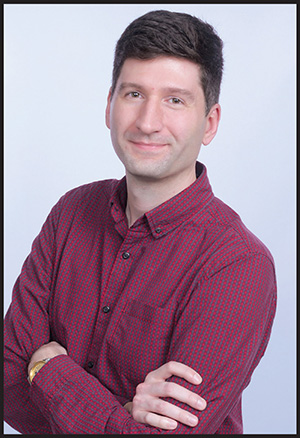Scott Summers | Movers & Shakers 2024—Educators
“Librarians have the wit and grit to get things done,” says Scott Summers, a former high school English teacher and school librarian who now brings that experience to his work as assistant director of the Media and Education Technology Resource Center at NC State University’s College of Education.
 |
CURRENT POSITIONAssistant Director, Media and Education Technology Resource Center (METRC), North Carolina State University DEGREEMLIS, University of North Carolina at Greensboro, 2019 FAST FACTSummers is a trivia nerd and was once a contestant on NPR’s Wait Wait…Don’t Tell Me! FOLLOWgoodreads.com/user/show/10981972-scott; ced.ncsu.edu/metrc Photo by Davi' Ortiz |
Getting S.P.I.F.F.Y.
“Librarians have the wit and grit to get things done,” says Scott Summers, a former high school English teacher and school librarian who now brings that experience to his work as assistant director of the Media and Education Technology Resource Center at NC State University’s College of Education. There, he helps new teachers understand what they’re facing and how they can work with school librarians to fight censorship.
“School librarians in particular are tireless advocates not only for their profession, but for the populations they serve,” he says. “I am honored to count myself among their ranks.”
In 2023, Summers initiated the “Get S.P.I.F.F.Y.” (Students Protecting Intellectual Freedom for Youth) course after attending local school district board meetings, where he saw parents, community members, and teachers speaking out against book bans, but not many students. The course educates future teachers about challenges to books and materials in school and public libraries. By studying case law, challenge policies, professional organization guidelines and ethics, and resources for protecting intellectual freedom, they learn the importance of the right to read and how to advocate for themselves and their students.
Ten percent of College of Education undergrads enrolled in “Get S.P.I.F.F.Y.” The 28 (to date) students who have completed the course reported that, thanks to what they learned, they felt well-informed about intellectual freedom and book challenges. There are currently 61 enrolled.
“Students overwhelmingly say they are more prepared to speak up about book and classroom materials challenges than before completing the course,” Summers states. “I hope they encourage their future students to be informed and engaged with these issues, too.”
Add Comment :-
RELATED
ALREADY A SUBSCRIBER? LOG IN
We are currently offering this content for free. Sign up now to activate your personal profile, where you can save articles for future viewing









